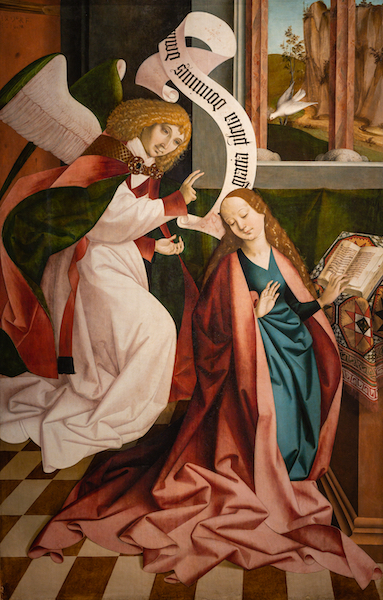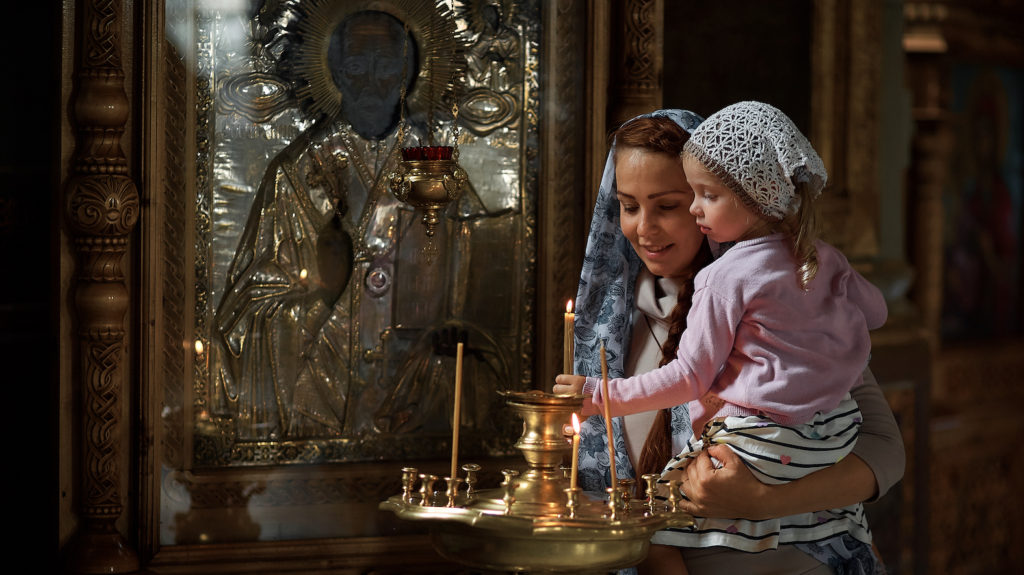What will the Church look like three generations from now? And how should the Church change to respond to the challenges of our times?
It’s a question that’s sparked plenty of debate among Catholics, especially during the pontificate of Pope Francis. But it’s sparked similar discussions in some sectors of Orthodox Christianity.
Carrie Frederick Frost is a Greek Orthodox theologian, writer, and professor at Western Washington University and St. Sophia Ukrainian Orthodox Seminary. Her first book, “The Maternal Body” (Cambridge University Press), explored the experience of maternity in the Orthodox tradition. Her most recent book, “Church of Our Granddaughters” (Cascade Books, $20) looks at the future Orthodox Church from the perspective of men and women living two generations from now.

Frost recently spoke to Angelus about topics including women in the Church, passing faith to new generations, and what Catholics can learn from our brothers and sisters in the Eastern tradition. The conversation has been edited for length.
In your first book, you explore the Church’s rich tradition on the embodied experience of maternity. How did your research help you during your own unusual experience of maternity — namely, giving birth to triplets?
As I wrote in “Maternal Body,” the experience of finding out I was pregnant with triplets in the middle of my Ph.D. program shook me up. At that time I was already a mother of two, but the triplet pregnancy raised the spiritual stakes for me — and the physical stakes, too!
What was comforting in my own tradition and true to my experience was the affirmation that spiritual and physical stakes are deeply intertwined. We know this from the Incarnation, but the Orthodox Church honors maternal experience in particular as witnessed in its celebration of feasts of conception and birth giving; in icons, hymns, and homilies.
What is it that Christian women can offer to their (non-Christian) peers in terms of helping them understand, valorize, and fully live their vocation?
This makes me think of many of my university students, most of whom have no religious affiliation or interest in the life of a religious practitioner. As one of them asked in a “Women and Religion” class a few years ago, “Professor Frost, why bother?” Meaning, why is it worth sticking around in a tradition that I acknowledge (sometimes) diminishes and demeans women?
There are many ways to answer this question, but my life is an example of a woman who appreciates and loves my tradition while acknowledging and working to fix its shortcomings. My students see that I “bother” because it’s worth it.
The same student told me later that this helped her assess what’s worth bothering about and what’s not, noting that her generation generally believes that no religion, entity, or institution is “worth it.” I think Christian women are able to witness what’s “worth it” in a unique way.
What is the biggest concern facing our granddaughters 30 years from now? How can the Church equip them to tackle those challenges?
I worry about a trend that I would call “disembodied acedia.” Our commercial and digital age includes strong anti-Incarnational messages that promote apathy and despair. The Church is not immune to these trends and pressures. For me, this makes the need to bring the Church’s practices regarding women (which revolve around women’s bodies) into alignment with its teachings all the more urgent. The larger culture sorely needs the Incarnational wisdom only the Church has to offer. I hope we get our own house in order so that we may witness well.
I can imagine critics of your book might dismiss your thinking about women as a capitulation to societal trends, or an instance of feminism infiltrating the Orthodox Church. How would you respond?
I would challenge anyone who reads the book to make such a charge. The book’s claims and reasoning are based on Church teachings, logic, and language. It is not written in the mode of contemporary feminism, nor is it aligned with the thrust of contemporary feminism.
Furthermore, I point out that to continue to deny women their equal dignity in the Church is itself a reactionary capitulation to societal trends and failure to live up to the Church’s own teachings.
This being said, it’s not a bad thing that contemporary feminism — especially its effects in the larger ecumenical community — has questions that Churches can answer. They should do so from their own truth. This is what I have tried to do, while admitting that I am — just like everyone else — living in time and not immune to larger cultural trends and influences.

What are some of the ways in which the Orthodox Church has failed women?
In the book, I address what I perceive to be the Church’s major failings regarding women:
First, theological anthropology. Many contemporary efforts to create a theology of “man” and “woman” either subordinate women or dismiss the importance of sex differentiation altogether, without taking into account our theology of the person and the Incarnation.
Second, menstruation: In some areas of the Orthodox Church today, women and girls are banned from receiving the Eucharist when menstruating.
Third, miscarriage. The prayers available to most priests for miscarriage do more pastoral harm than good by conflating intentional abortion with miscarriage and holding the mother culpable.
Fourth, childbirth: The prayers that welcome a new mother back to church associate childbearing with spiritual and bodily “impurity” or “defilement.”
Fifth, leadership: The Church only recently and on rare occasions has welcomed women into positions of leadership, such as tonsuring them as liturgical readers and chanters, hiring them as seminary professors, or seeking their input on synods and councils.
Lastly, ordination: The Orthodox Church has allowed the venerable order of deaconess to largely languish in the last few hundred years, despite many recent calls to reinstitute this ordained office.
What should change? And how can the Orthodox Church implement change while staying true to its theological and scriptural foundations?
Each of the above failings can be addressed by the Orthodox Church because it is simply a matter of bringing our practices into alignment with our theological and scriptural foundations.
The Orthodox Church should address questions around sex differentiation and gender in a way that is faithful to its dogma but also creatively encounters the questions of our own time, knowing that we cannot look to the ancient Church for answers for questions not asked.
The Church should clearly state and teach from the pulpit that any Orthodox Christian who is prepared by prayer and fasting may approach the chalice; that our understanding of impurity is not dictated by bodily circumstance but instead sin, and menstruation is not sinful.
New, pastorally and theologically appropriate prayers to mourn the loss of a pregnancy, as well as to mourn stillbirths and infant deaths, should be created with the help of faithful mothers.
Similarly, new prayers should be written that frame a new mother’s emergence from the postpartum period in a godly way but do not label her as impure or defiled; childbirth itself is not inherently sinful.
The Church should tonsure women who are readers and chanters — many women are doing this work today — and should actively recruit and involve women into other roles like seminary professors and conciliar theological consultants. Lastly, it should reinstitute the ordained order of deaconess.
You suggest several times in the book that the Orthodox Church’s treatment of women is one of the reasons many young people are leaving. Are there other areas where you see that the Orthodox Church is in need of reform?
Yes. The Orthodox Church ought to remove the antisemitic language that appears in some of our worship, especially during the week preceding Pascha/Easter. Also, the Orthodox Church as it presents in America often has an enclave mentality. Our true mission is not to perpetuate ethnic identity nor to align ourselves in the culture wars, but to serve “on behalf of all and for all.” We have much work to do in this area and can look to our Roman Catholic sisters and brothers for admirable examples and inspiration.
You suggest that many of the Orthodox Church’s failures to minister to women stem from a rejection of the Incarnation. What you mean by that?
Our understanding of our bodies is deeply involved in the way we know Jesus Christ. Many of the heretical ideas around Jesus in the early Church inflated his divinity at the price of his humanity, because it was so hard to accept that God would take on a human body in all of its messiness and squalor. Indeed, this messiness, all this flesh and blood, is why the early Christian theologian Irenaeus called the Incarnation a scandal.
We embrace and celebrate the human body in light of the Incarnation, not as an idol to worship and not because we are gods, but because, to reference the patristic maxim, God became human so that we might become like God.
Our bodies are blessed by the Incarnation as the workshop for the transfiguration and deification of our whole person. When women’s bodies are set aside (such as in the case of menstruation practices) as lesser than men’s, as impure, unclean, or defiled, then we fail to honor the reality and truth of Jesus Christ’s incarnation. We compromise our own transfiguration and deification — not just for women, but for the entire community.
Can Catholics learn from the Orthodox Church when it comes to addressing the role of women?
I am uncomfortable assessing a tradition other than my own, but I will note that there are vibrant and parallel movements working toward the reinstitution of deaconesses in both Christian East and West today. Surely this indicates shared failings, but also shared hopes.
The Orthodox Church today is slowly beginning to acknowledge the disparity between theology and practice when it comes to women. This seems so simple — to admit things have not always been perfect. Yet it is quite hard for the institutional Church and some of the faithful.
Much is said about Catholics and Orthodox learning from each other’s mistakes, but my hope is that we may additionally learn from our (nascent but growing) willingness to admit our mistakes. The honesty and self-reflection involved in acknowledging what has gone wrong is essential to a good-faith effort to leave a robust and healthy Church to our grandchildren. May this be so for both Christian East and West.

